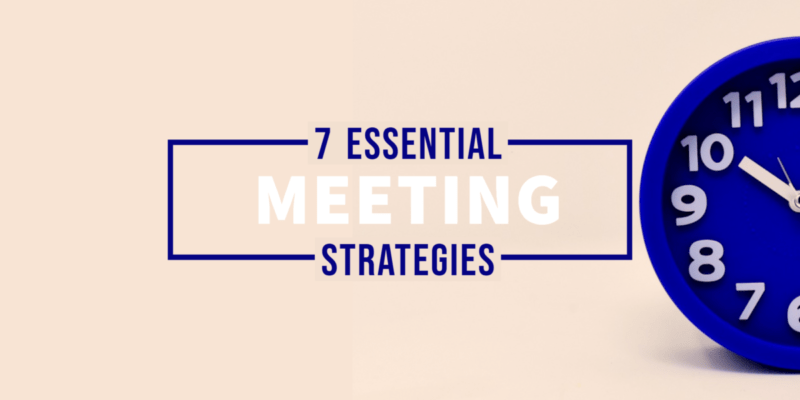The meetings become embedded in the daily life of a company. There are various reasons why they can be put in place. Your challenge, make them productive and captivating! It must be clear that attending meetings is not an objective in itself, a meeting aims to resolve an issue (or issues) that otherwise would not be possible or would be more expensive: neither by phone or by email, etc.
On the other hand, during the time that we are together our usual workload will not decrease but on the contrary, it will increase with the emails that we have not been able to read or deal with and with the topics that we have not been able to develop during the duration of the same.
For all these reasons it is necessary to hold the meetings in the most effective way possible and here are 7 Meeting Strategies to achieve it:

Be Punctual.
Every day more, it costs to be able to make an appointment for a meeting: it is necessary to square several agendas of different people, the volume of work is considerable, for that reason not to invest the time to other people in waiting for us to arrive is something very important.
Respecting the start time will lead us to finish even earlier and be able to take advantage of the time much better and we will avoid starting the session with a slight tension due to our lack of tact with respect to the rest of the attendees.
Notify In Advance

The meeting occupies a large place within the company. It is still necessary to inform in advance and not on the day itself so that everyone can attend. What usefulness can we find if no one is available at this time or if everyone is in a hurry? Any! Giving the date before makes it possible to organize this one well and to take the necessary time. Do not wait until the last moment!
Define Real Objectives

Establish a clear and defined scope for the meeting and also that can be covered during the duration of the meeting:
Before calling a meeting, we must be clear about what the objectives of the meeting are and we should be able to list them.
Trying to solve an exaggerated number of objectives can lead us to resolve none: it is preferable to be restrained in scope and to be more executives.
In the call of the meeting, we must notify the objectives to those summoned to it, so that they can know them, know what issues have to be prepared and know what we are going to restrict.
Invite The Right People

Participants attending the meeting must be the minimum number necessary for it to be done quickly and productively.
We must invite one person for each of the parties involved who have to contribute their vision and/or approval to at least one of the topics of the meeting.
If we did not do so, we could have to end the meeting without reaching our goal for missing the opinion of absent persons, not being able to take advantage of the time invested.
Summoning an excessive number of people is also a problem since it forces us to have more shifts of words and more opinions that could alter the agenda. Unfortunately, more opinions do not always imply that they are based on what being able to manage and control many participants, their shifts of words, their replies and against aftershocks can be a titanic task that overly extends the duration of the meeting and that we prevent reaching the marked objective.
Respect The Turn Of The Word.

A meeting must have an alternate conversation dynamics and without acrimony, where each party listens to the other, being able to defend their arguments with vehemence but always with respect.
Therefore, it is very important to respect the speaking time of each of the parties that are in dialogue, facilitating in this way the understanding of the positions that are exposed, allowing to get to know the arguments of each party and helping to maintain above all a Calm tone without promoting aggressiveness or positions on the defensive.
Limit The Duration Of The Meeting.
An hour or an hour and a half are more than enough time to deal with normal topics in a meeting. If a meeting is excessively extended, it can lead to a deterioration of the positions we are defending and even to the erosion of the person.
Moreover, it can lead to the participants disconnect from what we try to argue and lose interest in the issues we are dealing with, connect with their laptops, tablets, smartphones and start to perform other tasks that should be dedicated to It is the agenda of the meeting.
Go Back
At the end of the meeting, it is useful to provide a summary of the major points discussed as well as the changes that will be put in place. Appoint a person at the beginning of the meeting who will have to take down the necessary information before starting. He or She will send it to each participant. Everyone will be informed even those who have not been able to go there. A good account summarizes both the positives and the negatives. Do not hesitate to take advice on the meeting, but also on the clarity of the report. You can send an email or ask directly to the participants, to know their feelings about the meeting and implement improvements according to their feedback. If they cannot find fault, perfect! Your meeting remains a real success!
We hope you can test these 7 ideas for good meetings. Surely in a short time, you will realize how they are improving the meetings in your company.
